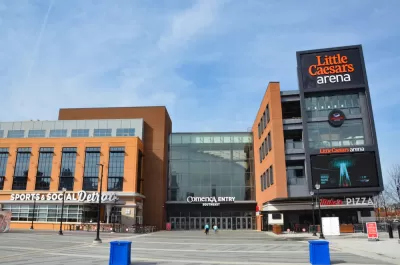In exchange for generous public subsidies, Illitch Holdings, owner and developer of the Little Caesars Arena in Detroit, promised large-scale economic development.

"Just over a year after Little Caesars Arena opened its doors for the first time, Ilitch Holdings is celebrating the changes that have come to Detroit and noted that it's only the beginning," writes John Gallagher.
Gallagher lists the economic development and tax revenue benefits touted by the company, which include, 3 million guests to the arena, $600 million in contracts to local companies and 20,000 jobs, a 456 percent increase in property tax base in the district, 40,000 square feet of additional commercial development, and $200 million in funding commitments to additional redevelopment projects.
Planetizen first reported criticisms of the generous subsidies allowed the sports arena back in 2014, and the public investments continued into 2017. In 2016, the Illitch family has promised that the city's investment in the arena and surrounding sports and entertainment district would reap additional private investments in the area.
FULL STORY: How Little Caesars Arena has changed Detroit

Alabama: Trump Terminates Settlements for Black Communities Harmed By Raw Sewage
Trump deemed the landmark civil rights agreement “illegal DEI and environmental justice policy.”

Study: Maui’s Plan to Convert Vacation Rentals to Long-Term Housing Could Cause Nearly $1 Billion Economic Loss
The plan would reduce visitor accommodation by 25% resulting in 1,900 jobs lost.

Why Should We Subsidize Public Transportation?
Many public transit agencies face financial stress due to rising costs, declining fare revenue, and declining subsidies. Transit advocates must provide a strong business case for increasing public transit funding.

Paris Bike Boom Leads to Steep Drop in Air Pollution
The French city’s air quality has improved dramatically in the past 20 years, coinciding with a growth in cycling.

Why Housing Costs More to Build in California Than in Texas
Hard costs like labor and materials combined with ‘soft’ costs such as permitting make building in the San Francisco Bay Area almost three times as costly as in Texas cities.

San Diego County Sees a Rise in Urban Coyotes
San Diego County experiences a rise in urban coyotes, as sightings become prevalent throughout its urban neighbourhoods and surrounding areas.
Urban Design for Planners 1: Software Tools
This six-course series explores essential urban design concepts using open source software and equips planners with the tools they need to participate fully in the urban design process.
Planning for Universal Design
Learn the tools for implementing Universal Design in planning regulations.
Smith Gee Studio
Alamo Area Metropolitan Planning Organization
City of Santa Clarita
Institute for Housing and Urban Development Studies (IHS)
City of Grandview
Harvard GSD Executive Education
Toledo-Lucas County Plan Commissions
Salt Lake City
NYU Wagner Graduate School of Public Service


























